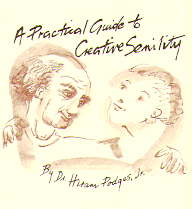 A Practical Guide to Creative Senility
A Practical Guide to Creative Senility A Practical Guide to Creative Senility
A Practical Guide to Creative Senility|
Endorsements |
"Looking at aging from inside Hiram Podges is a delight! That's what I'd hoped aging would be like." Ram Dass
"This is a book for everyone, of any age, who wants to live life to its fullest." Michael Ray, co-author of Creativity in Business
"Great! This is a much needed, pragmatic and inspiring book for anyone growing older, in essence, all of us." Michael Toms, host of New Dimensions radio series
|
Table of Contents |
The Formative Years (1907-1976)
What Sort of Fellow I Am
All the Hard Luck Stuff
I Get to Be the Prince
How the Red Carpet Got to be Rolled Out
Broken Promises
The Practical Guide Itself
Forgetfulness, the Finest Flower of Them All
I Am a Guinea Pig
They Try to Coop You Up
I Live on the Goal Line
Killing with Kindness
They Think I'll Lose My Balls
Bright Red Means Keep Out
A Self-made Basket Case
Doctors Think You Are Statistics
I Discover the Vacuum
Once Again, the Third Degree
The Glad Hand Attack
The Shrink and I
My Very Best Friend
I'm in Love, I'm in Love, I'm in Love
Second Adolescence
When the Cat's Away, the Mice Will Play
I Cultivate Mind Wandering
It's Fun to Weep
Will Wonders Never Cease
You Just Never Know....
Even More Than Neighborly
Home Safe in the Empire of the Dolphins
|
Excerpt |
I got born in Cedar Rapids, Iowa, and stayed there for ten years. I was just eleven when I saw my first dead person. Some old guy had flopped down on his back on the sidewalk and I could see by his face that's what death is. All I could think was something like, "That happens to some people and it's weird," and I ran off to play softball.
Same way with old folks I'd see here and there - weird, like ostriches or giraffes.
I had the standard Iowa Presbyterian upbringing - no problems except that they made me go to Sunday school on Sunday mornings. My dad whipped me a few times and mom wet-kissed me more than I liked, and when the three of us and my sister went to the movies, mom would check my ears when we got to the street car stop and she always found they were dirty, so she took out her hanky, spit on it and cleaned them out. That was the worst thing she did to me, so why should I complain? We were like those families by Norman Rockwell that you used to see on the cover of the Saturday Evening Post before it went broke - nice, well-scrubbed, happy-go-lucky faces with no big ups and downs.
There were hardly any automobiles around in those days. Only rich people had cars until Ford made his Model T. One afternoon my folks had the honor of being invited by Mr. James Tarlock, the banker, to have a ride in his Marmon. The car got wrecked and both mom and dad got killed.
I was twenty years old, but I admit I shed many a tear for them while alone in my room.
I got married a few years later to Miss Violet Gerber. She was half-Hungarian and half-English. The Hungarian part made her look very mysterious, while the English part made her always ready for a good laugh. We moved to Iowa City so she could attend the University of Iowa, but she only held out for two years. She didn't like all that studying.
When I was fifty-nine, she died on me. That night in the hospital, while I stood by the bed looking at her, I suddenly knew all at once she was dead. It was like little hands inside my belly grabbing me tight. She was dead - just as dead as that fellow I saw lying on the sidewalk in Cedar Rapids. But her eyes were wide open, and I saw she kept looking at something. It seemed to me she probably saw that where she was going to was a big, nice surprise, by golly! - and even bigger and nicer than, when you're a kid, they bring in the birthday cake with the candles all lit for you to blow out.
I wished I could cry, but all I could feel was amazement at her seeing all that when she was supposed to be dead. After a while some tears came down my cheeks. They were almost tears of being glad for her. I felt sort of uneasy that I wasn't fuller of grief. Then the nurse came in and said, "Hiram, it's all over. I'll just close her eyes." I grabbed that nurse and held her real tight so she couldn't do that. The nurse said, "We have to close the eyes." Why should I let the hospital tell me what I had to do about my wife? Other people came in and I was like a tiger and fought them off, and that was how she went to the undertaker, with her eyes seeing something that you and I never can see. Even though they raised me as a Presbyterian, I can't say I was what you'd call religious. But Violet's eyes told me something, so that ever since then I never was afraid for myself to die. (Well, not all the time, to be honest, but most of the time I wasn't.) For days and days after that, I cried and cried.
Still, I had my position as the headwaiter at the university faculty club. The honor and eminence of my position made me feel I was somebody, and helped me get by without Violet.
Maybe I've wandered off the subject of this book. But you ought to have some idea of what sort of fellow I am.
Blue Dolphin Publishing, 1988